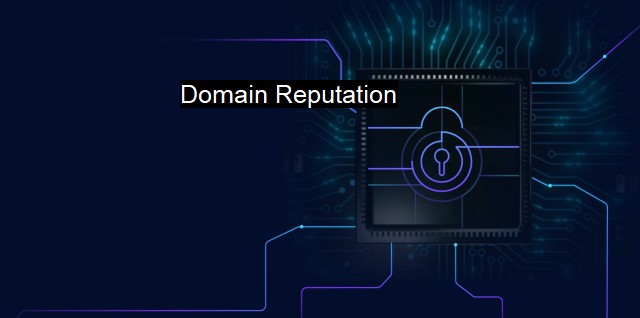What is Domain Reputation?
The Importance of Domain Reputation in Cybersecurity and Antivirus Software
Domain reputation is a critical concept in the cybersecurity landscape. Domain reputation conveys the trustworthiness of a website and impacts the efficacy of email filters and how search engines rank sites. Addressing a broader spectrum than the authentication of online identities, it also has a profound influence on your overall online presence. It's a score given based on a domain's past activities, engagement with users, and adherence to best practices in offering web services.The general rule of thumb is, the lower the domain reputation score, the greater the potential threat. Unfortunately, cybersecurity threats abound in the contemporary virtual realm with attacks such as phishing, malware distribution, and Schemes aimed at stealing personal identities or hacking into systems becoming increasingly rampant. As such, domain reputation is an invaluable asset in monitoring and offering pre-emptive safety measures against the influx of these varied threats.
Antivirus software also heavily incorporates domain reputation mechanisms to detect and block potential threats. The software checks the reputation score of each domain a user interacts within real-time. With each interaction, the software performs an analysis, comparing the domain to a database of flagged or dangerous sites, as a preventive measure. If integrity concerns surface from the comparison, the antivirus software blocks content from the domain or issues a warning about its potential dangers.
Highly reputable domains ensure data protection, secure online transactions, and add a protective layer that prevents cyber attackers from perpetrating attacks swiftly. This reputation does not spontaneously materialize. Instead, it accrues over time, signifying an exemplary record of offering secure and reliable web services by the domain. A high reputation score stems from stringent adherence to domain legitimization protocol, use of secure website certificates (SSL), quality backlinks, secure hosting, and more. As a result, cyber attackers often find it a daunting task penetrating domains with high reputation scores.
The realm of domain reputation isn't devoid of complexities. Cybersecurity threats often take on dynamic forms, masking malicious software in seemingly benign content. At such times, domain reputation acts as the primary line of defense, blocking known untrustworthy sites and content earmarked previously. It is not uncommon also for legitimate domains to get compromised. Therefore there's an ongoing struggle in maintaining a continually updated database of trustworthy sites, ensuring a balancing act that allows a safe experience in the world wide web for users.
Similarly, it is worth noting that while domain reputation assessment technologies are instrumental, they are not foolproof. Threats can emanicpate from new domains that have no history and established malicious domains that have managed to improve their reputation slowly over time. Hence, it is a constant game of cat and mouse between those safeguarding and those trying to exploit the digital space.
Domain reputation affects numerous other aspects of online visibility and engagement. It influences email deliverability critically. If a domain bears a low reputation score, emails from such domains often end up relegated to the spam or junk folder of recipients, and there's often an increased likelihood of ISP's blocking access to such domains.
Domain reputation is a fundamental element in the cybersecurity universe. It affects everything from email deliverability to search engine ranking and offers a beautiful balance between usability and security in the digital landscape. Keeping a strong watch over the domain’s reputation is a critical piece in establishing trust, boosting SEO rankings, enforcing better delivery rates, and maintaining a safe online environment. Therefore, much effort should be put towards improving and maintaining a good domain reputation. In the ever-evolving and complex landscape of cybersecurity, domain reputation continues to serve as a valuable barometer of trust and safety.

Domain Reputation FAQs
What is domain reputation and why is it important in cybersecurity and antivirus?
Domain reputation refers to the reputation of a domain as perceived by email and antivirus systems. It is important in cybersecurity and antivirus because it helps determine whether an email or website is trustworthy or not. A domain with a poor reputation is more likely to be associated with spam, phishing, or malware.What factors affect domain reputation?
Several factors can affect a domain's reputation, including the domain's age, history, and content, as well as the IP address used by the domain. If a domain has been associated with spam, phishing, or malware in the past, this can negatively impact its reputation. Similarly, if the content on a domain is low-quality or appears spammy, this can also cause a decline in its reputation.How can I check the reputation of a domain?
You can check the reputation of a domain using various online tools, such as Google Safe Browsing, VirusTotal, or MX Toolbox. These tools analyze the domain's history, content, and behavior and assign it a reputation score, which can help you determine whether the domain is safe to use or not.Can domain reputation be improved?
Yes, domain reputation can be improved by taking proactive measures such as monitoring the domain's behavior, identifying and removing any malicious content, and implementing security best practices, such as using strong passwords and encryption. Maintaining a positive domain reputation requires ongoing effort and vigilance, but it is essential for protecting against cyber threats.| | A | | | B | | | C | | | D | | | E | | | F | | | G | | | H | | | I | | | J | | | K | | | L | | | M | |
| | N | | | O | | | P | | | Q | | | R | | | S | | | T | | | U | | | V | | | W | | | X | | | Y | | | Z | |
| | 1 | | | 2 | | | 3 | | | 4 | | | 7 | | | 8 | | |||||||